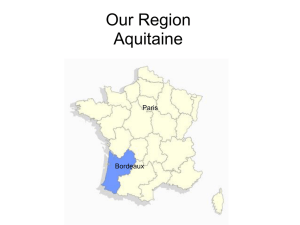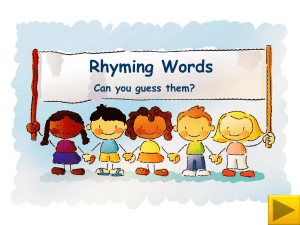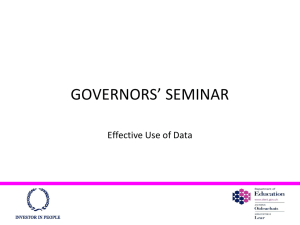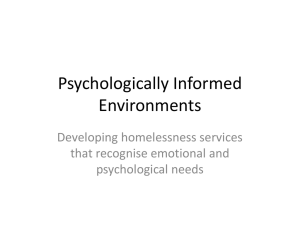The teachers role and training needs in psychologically and
advertisement
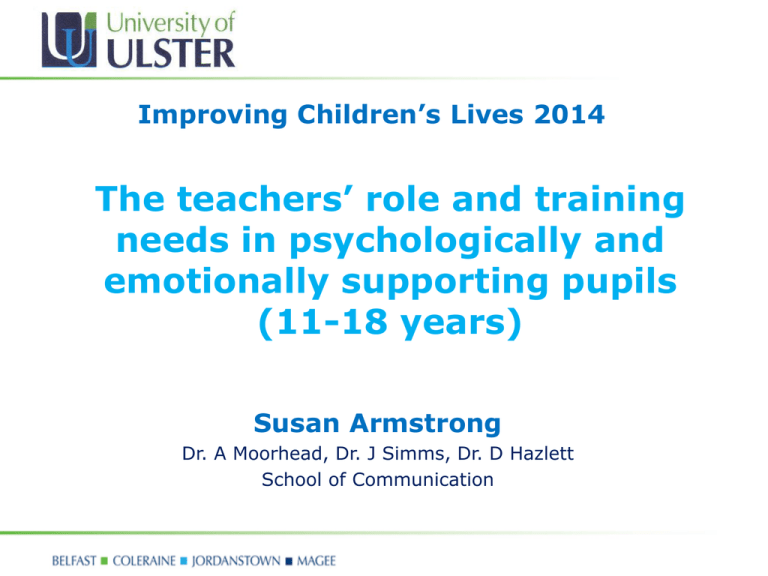
Improving Children’s Lives 2014 The teachers’ role and training needs in psychologically and emotionally supporting pupils (11-18 years) Susan Armstrong Dr. A Moorhead, Dr. J Simms, Dr. D Hazlett School of Communication PhD Project To determine and define the teachers’ role in psychologically and emotionally supporting pupils (11-18years), to identify the teachers’ training needs and to provide recommendations for potential training facilitation for teachers’. Background • • • • • • 1 in 4 Mental Health Issue 1 in 10 Eating Disorder 1 in 10 Neglected, 1 in 9 Physical Abuse, 1 in 6 Sexual Abuse 25% Bullied – 38% Cyber Bullied 1 in 10 self harm 14% think about suicide • Protect Life Strategy 2006 • DHSSPS - Bamford Review 2002-2007 • DENI announced in 2009 that school counselling would be available to all post primary pupils (DENI, 2009; Welsh Assembly, 2006; NIMHE/CSIP, 2005; New Life, 2011; Samaritans, 2013; O’Connor, 2010; YLT Survey, 2009;NSPCC, 2013; Sullivan & Patrick, 1995; Burns, 2006, youth@clc 2013) Research Rationale • ‘Whole School’ Approach • Recognise Teachers Role • PEHAW – Pupils Emotional Health and Well-being – Queens University study (2012) • Suggestion of a role for teachers • Need for teacher training − Youth@clc Report • 42% would turn to teachers’ • Mental Health training for teachers’ (Beesley, 2004; Amatea & Clark, 2004; Wilgues & Shelley, 1988; Connolly et al. 2012) Research Questions: 1) What role do teachers’ have in psychologically and emotionally supporting pupils (11-18 years)? 2) What are the training needs of teachers’ to psychologically and emotionally support pupils(11-18 years)? 3) How can the training needs of teachers’ in psychologically and emotionally supporting pupils (11-18 years) be facilitated? Overall PhD Methodology This study is designed with 4 components: Literature Review Interviews Online Survey Provide Recommendations Ethical Approval obtained February 2013 – School of Communication Filter Committee Methodology Interviews: • Database (n=216) • Contacted Principals (n=216) • Response Rate: 16.6% Methodology - Interviews Recruitment Consent Conduct Transcribe Analyse Results Analysis Interpersonal Phenomenological Analysis (IPA) • Analysed transcripts • Identified the overarching and sub themes • Interpret unique subjective experience of teachers Results • Total of 15 Interviews (19 Participants) Demographics of Participants Education Board Gender Age (yrs) Experience (yrs) BELB 4 Male 7 20-30 1-5 NEELB 7 Female 12 30-40 4 5-10 2 SEELB 4 40-50 4 10-20 4 SELB 2 50-60 11 20-30 5 WELB 2 30+ 8 Overarching Themes Sub-Themes Teaching Experience Experience of Student Support Role, Previous Training/Teacher Training, Positions Held, Previous and In Job Training Teachers’ Role What is the Teachers’ Role?, Definition of Role, Does the Role Exist?, Current Support Limitations of Role Boundaries, Communication, Pressure, Mindset of Teacher Teachers’ Needs Counsellor Support and Training, School Support, Support Needed, Concerns Training Needs Issues with Teacher Training Courses, Issues and Limitations of Training, Potential Training, Need for Training School Role Counselling Provision, School Effort, Whole School Approach, Training and Strategies, Comparisons and Differences Issues faced by Young People Emotional, Mental Health, Physical Wellbeing, Family, Online, School Support Teachers’ Role “Not only that there is a role, but if teachers are not doing it then I don’t think they are teaching” (P8) “To take any obstacles out of the way of achievement – can be academic, social, personal problems, the whole gambit” (P1) “To do our best for the children and make tomorrow better than yesterday” (P1) “Nobody is taking account of the emotional toll that takes on staff” (P7) Training Needs of Teachers “Focuses on the development of practicing teaching as opposed to pastoral development and the needs of the child nonacademically” (P9) “There isn't any training for that – it doesn’t exist” (P1) “Training hasn’t caught up with what's happening in the world” (P4) “What to do, what not to do, what to say, what not to say” (P9) Conclusion • Identified teachers’ role • Identified need: – Awareness – training – supported Further Research • PhD ongoing • Phase 2 • Limitations By meeting the training and support needs of our teachers, we can better address the mental and emotional needs of our pupils, and improve the lives of our children.

![afl_mat[1]](http://s2.studylib.net/store/data/005387843_1-8371eaaba182de7da429cb4369cd28fc-300x300.png)



